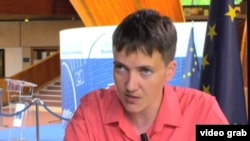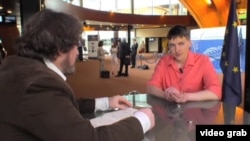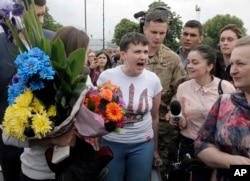Nadiya Savchenko, the former military Ukrainian pilot captured by Russia-backed separatists in eastern Ukraine in 2014, spent nearly two years in a Russian prison before being swapped for two captured Russian servicemen in May.
Now a member of Ukraine’s parliament, she was in Strasbourg, France, this week as her country’s delegate to a meeting of the Parliamentary Assembly of the Council of Europe (PACE).
In a speech on Monday to the European human rights body, Savchenko described herself as having been “kidnapped” in “a breach of human rights” that should be reviewed by the European Court of Human Rights. She called attention to other Ukrainians in Russian jails, as well as Crimean Tatars in Russian-occupied Crimea, who have been and continue to be “kidnapped in the same way.”
“I do not wish that anyone should go through what I have been through, and what Ukrainians are going through now,” Savchenko told the PACE delegates. “And I do not wish anyone to have such a neighbor as Russia.”
Savchenko this week also caused controversy at home after she was quoted as saying there should be direct talks between Kyiv and the heads of the Russia-backed self-declared Donetsk and Luhansk people’s republics – a position contrary to that held by Ukraine’s parliament and president.
Danila Galperovich of VOA’s Russian service discussed this and other issues with Savchenko in an interview at PACE’s Strasbourg headquarters.
Here are some highlights from that interview.
On how she feels about Russians:
"I’ve said it a hundred times and I will repeat: There are no bad nations, there are bad people. They are, unfortunately, everywhere. But there are also good people everywhere. When I received my first letters in prison, there were five letters, three of which were from Ukraine and two from Russia. And people wrote to me from Russia no less than from the rest of the world. And there are wonderful people in Russia. I know this and saw this. … Even among those who are the overseers in prison, there are all the same good people. And it was very nice to recognize this and to know that there is no hatred on a purely human level. It is only when people are manipulated and controlled that some hostile feelings are awakened in them. Before that, all people are generally inclined to love each other as a species, [as part of] the human race."
On criticism directed at her for saying it is possible to talk to separatist leaders:
"As for talking...It's not just my opinion. One woman wrote me a letter. She wrote that she had lost her only son in the war, on the Ukrainian side. And she said she really wanted me to survive – this was when I was on my hunger strike. And she said she clearly understood a mother on DNR, LNR [the separatists’ Donetsk and Luhansk people’s republics] said who had lost her son. If people who have lost more than anyone – their only sons – are ready to talk to each other, what right do intriguers or politicians have to say that it is impossible? It is always possible.
… Peace is impossible in an eternal war. Anyway, there will be peace sooner or later. And, of course, it is difficult to say the first word or make the first move. I am not afraid. I am ready to bear responsibility for it. If it will lead Ukraine to peace and to a normal existence without Russia … I'm ready to sacrifice … my image, reputation, for that."
On Western military aid to Ukraine and sanctions against Russia:
"Should [Ukraine] be aided with weapons? That depends on the determination [of the Western powers]. Simply providing weapons could lead the world to a third world war. If we look at the current situation, there should probably be consistent assistance. First of all, that surely means economic and political sanctions against Russia. Because that country needs to understand - or rather, its government needs to understand - that it did something wrong; that you cannot exist this way in the modern world. ... [Sanctions] should be extended, and I think it is necessary to introduce more personal sanctions, so that the people suffer less and the authorities suffer more, so that they [the authorities] themselves experience deprivation."
On humanitarian aid for Ukraine:
"Yes, of course, we will need humanitarian aid, because we are not coping with this very well, but I don’t want us only to be given the fish. I want us to be given the fishing rod, and to be taught how to fight corruption, how to move in the right direction. … The bicycle exists, there is no need to invent it; we just need to choose the one for us, our brand, get on it and go."
On whether Ukraine should join NATO:
"Earlier, I was against it – that was in 2006; now I think probably yes. If we do this correctly, then all the same we must anticipate betrayal: Russia also promised to protect our territory after [Ukraine’s 1994] nuclear disarmament, and put a knife in [our] back. But when you have a large number of allies there is less worry that you will be betrayed. If one betrays you, the others remain. Therefore, I think [Ukraine] should probably join."






